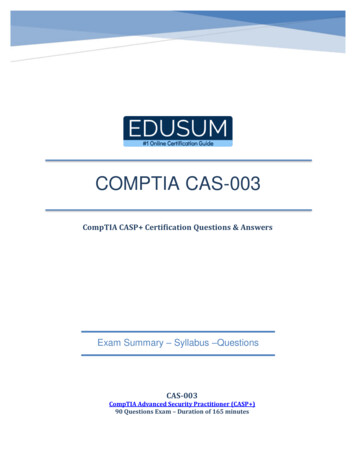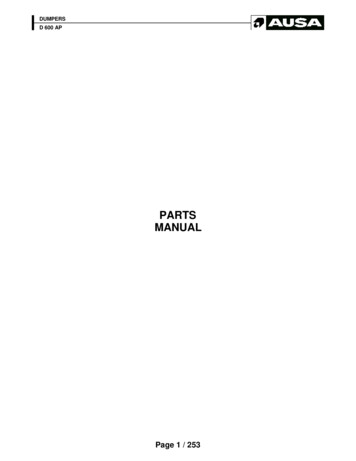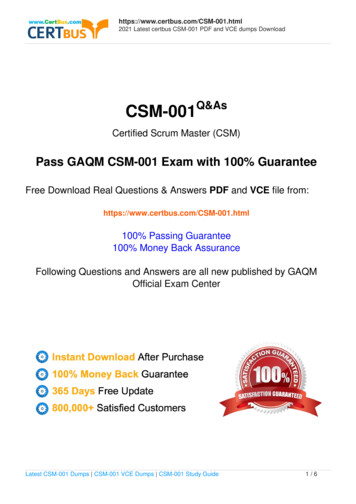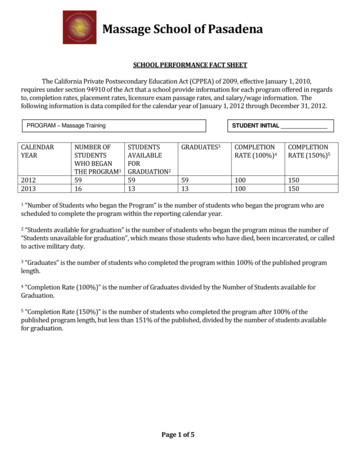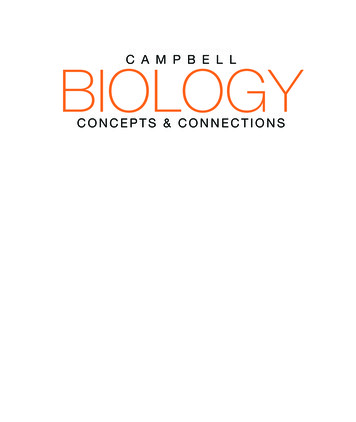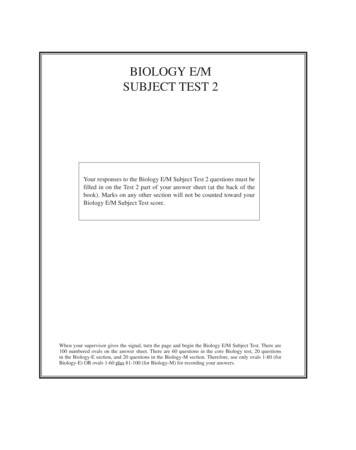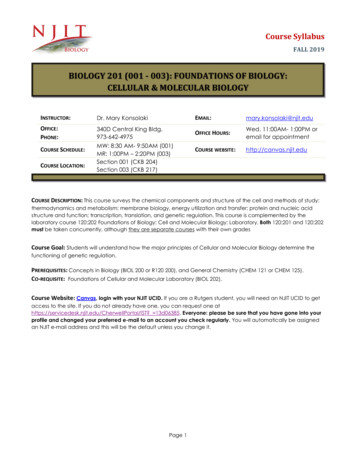
Transcription
Course SyllabusFALL 2019BIOLOGY 201 (001 - 003): FOUNDATIONS OF BIOLOGY:CELLULAR & MOLECULAR BIOLOGYINSTRUCTOR:Dr. Mary :340D Central King Bldg.973-642-4975OFFICE HOURS:Wed. 11:00AM- 1:00PM oremail for appointmentCOURSE WEBSITE:http://canvas.njit.eduCOURSE SCHEDULE:COURSE LOCATION:MW: 8:30 AM- 9:50AM (001)MR: 1:00PM – 2:20PM (003)Section 001 (CKB 204)Section 003 (CKB 217)COURSE DESCRIPTION: This course surveys the chemical components and structure of the cell and methods of study;thermodynamics and metabolism; membrane biology, energy utilization and transfer; protein and nucleic acidstructure and function; transcription, translation, and genetic regulation. This course is complemented by thelaboratory course 120:202 Foundations of Biology: Cell and Molecular Biology: Laboratory. Both 120:201 and 120:202must be taken concurrently, although they are separate courses with their own gradesCourse Goal: Students will understand how the major principles of Cellular and Molecular Biology determine thefunctioning of genetic regulation.PREREQUISITES: Concepts in Biology (BIOL 200 or R120 200), and General Chemistry (CHEM 121 or CHEM 125).CO-REQUISITE: Foundations of Cellular and Molecular Laboratory (BIOL 202).Course Website: Canvas, login with your NJIT UCID. If you are a Rutgers student, you will need an NJIT UCID to getaccess to the site. If you do not already have one, you can request one athttps://servicedesk.njit.edu/CherwellPortal/IST? 13d06385. Everyone: please be sure that you have gone into yourprofile and changed your preferred e-mail to an account you check regularly. You will automatically be assignedan NJIT e-mail address and this will be the default unless you change it.Page 1
Course SyllabusFALL 2019BIOLOGY 201 (001 - 003): FOUNDATIONS OF BIOLOGY:CELLULAR & MOLECULAR BIOLOGYCOURSE OBJECTIVES:Students are able to:Through selected readings, lectures, discussions and occasional group activities, students are encouraged to learnon their own about the main processes taking place in the cell from a molecular perspective. After successfullycompleting the course, students will have1.the ability to describe the general structure of biomolecules as well as their role in cellular metabolism andthe flow of genetic information;2.information and concepts on bioenergetics and the use of energy by cells;3.the information on the principles of membrane transport mechanisms and their role in importantphysiological processes at the organismal level;4.acquired concepts and general principles on gene expression and its regulation;5.knowledge on the concepts and general principles on eukaryotic signal transduction;6.the skills to read, interpret and apply general information in the fields of cell and molecular biology;7.evaluate contemporary hypotheses on the functional mechanisms of the cell;8.reinterpret and/or postulate alternative hypotheses or ideas to explain or describe the phenomena studiedin the course;9.the opportunity to explore the topics covered in the course in higher level classes which requireFoundations 201/202 as pre-requisites in the biology major and minor.REQUIRED MATERIALS: Alberts, Hopkin, Johnson, Morgan, Raff, Roberts, Walter Essential Cell Biology, 5th Edition, W.W. Norton &Company, NY. ISBN: 978-0393680362 https://www.norton.com/books/9780393680362Some additional reading may be occasionally assigned from the following online resources (free text):Scitable by Nature tics-5Pubmed eBook https://www.ncbi.nlm.nih.gov/books/NBK21475/?term Cell%20biologySUPPLEMENTAL MATERIALS: iClicker (please bring to every class), 3x5 notecards (in-class assignments will be handed in most classes. Theymust be 3x5 to stack correctly, no paper ripping). A couple different colors of pen or pencil are sometimeshelpful in diagramming problems. Any additional materials required for class would either be provided through Canvas (UCID required), handedout in class, or via web link.Page 2
Course SyllabusFALL 2019BIOLOGY 201 (001 – 003): FOUNDATIONS OF BIOLOGY:CELLULAR & MOLECULAR BIOLOGYGRADING POLICY & SCALE: Grades will be determined by performance on exams, quizzes, and class participation.Grades will be determined by the percentage of the possible points earned, following the standard grade scalebelow. Grades are not curved and do not ask for extra credit. Your grades will be posted to Canvas so you can keeptrack of your progress in the course.AssignmentsAttendance and participationLecture Exam 1Lecture Exam 2Homework & other assignmentsQuizzes (3)Final ExamTotalPercentage5%20%25%10%15%25%Letter GradeAB BC CDF100%Percentage90 – 10085 – 8980 – 8475 – 7965 – 7450 – 640 - 49Extra Credit: There will be no individualized opportunities for extra credit. There may be opportunities for the entireclass during the course.ACADEMIC INTEGRITY: There is zero tolerance for academic dishonesty in this course which includes both cheatingand plagiarism. The punishment for dishonesty in this course will be a zero on the assignment and a consultation withthe Dean of Students after which further action may be required. Please ask us if you have any questions. TheUniversity‘s academic integrity policy can be found here.Accommodations: If you have a special need that may require an accommodation or assistance, please inform meof that fact as soon as possible and no later than the end of the second class meeting. Students with disabilities whorequire accommodations must contact Dr. Phyllis Bolling, Center for Counseling and Psychological Services (CCAPS), Campbell Hall, (entry level), room 205, (973) 596-3420ELECTRONICS / CELL PHONE POLICY: The use of cell phones is NOT allowed in class. Please silence your cell phones duringclass.ATTENDANCE: Students are expected to attend all meetings of the course. Clicker questions, 3x5 notecards andsometimes quizzes will be used as a measure of attendance. If you expect to miss a class for a valid reason, pleaseemail Dr. Konsolaki and provide documentation (mary.konsolaki@njit.edu)Page 3
Course SyllabusFALL 2019BIOLOGY 201 (001 – 003): FOUNDATIONS OF BIOLOGY:CELLULAR & MOLECULAR BIOLOGYCOURSE OUTLINE: TENTATIVE SCHEDULE: Dates listed by week; lectures will meet twice every week, unless otherwisenoted. Homework assignments will be due on Wednesdays or Thursdays before class, on Canvas. Please note that this isthe proposed schedule and is subject to change. A more detailed schedule will be continually updated via the courseCanvas site.WeekofLecture TopicAssignments Due9/2Course description/Introduction to CellsPre-test (in class)9/9Chemical components of the cells/Importanceof pH in living organismsHW1 (Canvas)9/16Bioenergetics/Enzymes as biocatalystsHW2 ( Canvas)9/23Enzymatic reactions andkinetics/Protein structure and functionQuiz 1 on Canvas9/30DNA structure and chromosomes/Exam 1HW3 ( Canvas)10/7DNA replication/DNA repair and recombinationHW4 ( Canvas)10/14From DNA to RNA: Transcription/ From RNAto protein: TranslationHW5 ( Canvas)10/21Control of gene expression/Molecular evolution10/28Manipulating genes and cells/Exam 2HW6 ( Canvas)Membrane structure andtransport/Transport across cellmembranesHW7 Canvas )11/411/1111/1811/25Metabolic pathways/How cells obtainQuiz 2 on CanvasHW8 (Canvas)energy from foodEnergy generation in mitochondria:oxidative phosphorylation/Wed-Thu NoClass (Thanksgiving)Energy generation inchloroplasts:photophosphorylationHW9 (Canvas)HW10 (Canvas)Page 4
12/2Intracellular compartments andtransport/Signal transduction I: HormonesQuiz 3 on Canvas12/9Signal transduction II:intracellular signaling/ReviewNo HWExam 3/Post-test - During Final ExamPeriod*Final Exam Schedule will be /16***DO NOT SCHEDULE TRAVEL DURING THE FINAL EXAM PERIOD**Page 5
Course SyllabusFALL 2019BIOLOGY 201 (001 – 003): FOUNDATIONS OF BIOLOGY:CELLULAR & MOLECULAR BIOLOGYWEEKLECTURE TOPICREADING AND/OR ASSIGNMENTW - 9/6Course Introduction & PretestSyllabusM – 9/11Scientific Method, StatisticsSections 1.1 - 1.3; Statistics PrimerW – 9/13Statistics & Mini-Genetics ReviewOnline Genetics PrimerM – 9/18Origin of Genetic Variation, Population GeneticsSections 21.1 - 21.2W – 9/20Population Genetics Hardy WeinbergSection 21.3M – 9/25Quiz 1; Natural SelectionCase Study 4 (Malaria); Section 21.4W– 9/27Mechanisms of Evolution: Natural Selection / AltruismSection 21.4 Section 45.6M – 10/2Mechanisms of Evolution: Sexual SelectionSection 45.7W– 10/4Mechanisms of Evolution: Genetic Drift / Gene FlowSection 21.5M – 10/9Exam 1W – 10/11Population Ecology ISections 46.1 - 46.2M – 10/16Population Ecology IISections 46.3W – 10/18Community EcologySections 47.1 - 47.4M – 10/23Quiz 2; EcosystemsSections 47.5 – 47.6W – 10/25Ecosystems & Disease EcologyOnline ReadingM – 10/30Allopatric SpeciationSections 22.1-22.3W – 11/1Sympatric SpeciationSection 22.3-22.4M – 11/6Exam 2W – 11/8Phylogeny ISections 23.1 - 23.2Page 6
M – 11/13Phylogeny IISections 23.1 - 23.2W – 11/15History of Life on EarthSections 23.3 - 23.4M – 11/20Quiz 3; Human Evolution ISections 24.1 - 24.2W – 11/22NO CLASS - FRIDAY SCHEDULE (THANKSGIVING)M– 11/27Human Evolution IISections 24.3- 24.5W – 11/29Evolution of Human Skin Color - Case StudyOnline ReadingM – 12/4Anthropocene & Carbon CycleSections 48.1 & 25.1 – 25.3W – 12/6Global Climate change IM – 12/11Global Climate Change II & Conservation Biology IW – 12/13Conservation Biology IIFINALSSections 48.2; Case Study 8(Biodiversity Hotspots)Sections 48.3 - 48.4; Case Study 8(Biodiversity Hotspots)Sections 48.4 - 48.5FINAL EXAM WEEK: DECEMBER 14-20, 2019Note: this is a tentative schedule, any changes will be posted to CanvasPage 7
thermodynamics and metabolism; membrane biology, energy utilization and transfer; protein and nucleic acid structure and function; transcription, translation, and genetic regulation. This course is complemented by the laboratory course 120:202 Foundations of Biology:

